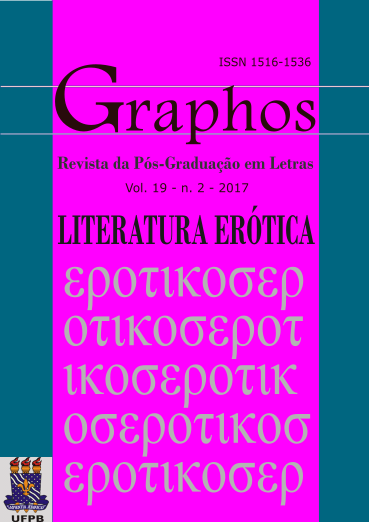Adélia Prado and the beauty of the bodies
Keywords:
Nudity, Theological Signature, Eroticism and Love, PoetryAbstract
One of the strategies of the Adelia's discourse poetic consists in the denudation of the human body and of the body of Christ. It is an erotic-political dynamic that seeks to rethink the theocentric inheritances and cultural representations, which brings up the feminine experiences of the late twentieth and early twenty-first centuries. From this perspective this article aims to return to the decisive moment of the construction of theological device that separated the “nature/nudity” of “grace/dress”, showing that by attempting to disclose and deactivate the theological signature that determined, in our culture, the concept of ‘nudity’ in exclusively privative terms, Adélia Prado provides some instruments to rethink of life’s nudity in the divine ban, and builds a poetic work that allows to reveal the erotic and loving experiences of the body, as representations and contemplation of power, through the beauty and the poetry.
Downloads
References
AGAMBEN, Giorgio. Nudità. Roma: Nottetempo, 2009.
_____. Estâncias. A palavra e o fantasma na cultura ocidental. Trad. de Selvino José Assmann. Belo Horizonte: UFMG, 2007a.
_____. Arte, inoperatividade, política. In: Política. Crítica do contemporâneo. Conferências internacionais Serralves. Trad. de Simoneta Neto. Coordenador geral Rui Mota Cardoso. Porto: Fundação Serralves, 2007b. p. 39-49. Disponível em: <https://www.serralves.pt/fotos/editor2/PDFs/CC-CIS-2007-POLITICA-web.pdf> Acesso em 10/03/2017.
BARTHES, Roland. O prazer do texto. São Paulo: Perspectiva, 2004.
BATAILLE, Georges. O erotismo. Antonio Carlos Viana. Porto Alegre: L&PM, 1987.
BENJAMIN,Walter. Angelus novus: saggi e frammenti. Trad. e introduzione Renato Solmi. 2 ed. Torino: Einaudi, 1982.
BIBLIA SAGRADA. Gênesis. Tradução João Ferreira de Almeida. L.C.C. Publicações Eletrônicas, versão para eBooksBrasil.org., abril 2006. Disponível em:<http://www.ebooksbrasil.org/adobeebook/biblia.pdf>. Acesso em: 18/04/2017.
COSTA, Jurandir Freire. Sem Fraude nem favor: estudos sobre o amor romântico. 3 ed. Rio de Janeiro: Rocco, 1999.
FOUCAULT, Michel. História da sexualidade I: a vontade de saber. 8 ed. Trad. Maria Thereza da Costa Albuquerque e J. A. Guilhon Albuquerque. Rio de Janeiro: Graal, 1985.
GIDDENS, Anthony. A transformação da intimidade: sexualidade, amor e erotismo nas sociedades modernas. São Paulo: Editora Unesp, 1993. [3ª reimpressão].
KEHL, Maria Rita. A mínima diferença: masculino e feminino na cultura. Rio de Janeiro: Imago,1996.
MARCUSE, Herbert. Eros e civilização. 8 ed. Rio de Janeiro: Zahar, 1981.
NUSSBAUM, Martha. Emozioni Politiche. Perché l’amore conta per la giustizia. Bologna: Il Mulino, 2014.
_____. La fragilità del bene: Fortuna ed etica nella tragedia e nella filosofia greca. Trad. Merio Scattola, trad. introd. Rosamaria Scognamiglio, ed. Italiana a cura di Gianfrancesco Zanetti. Bologna, Il Mulino, 2004.
PAZ, Octavio. A dupla chama: amor e erotismo. Trad. Wladyr Dupont. São Paulo: Siciliano, 1994.
_____. O arco e a lira. 2ª ed. Trad. Olga Savary. Rio de Janeiro: Nova Fronteira, 1982.
PLATÃO. O banquete. São Paulo: Abril Cultural, 1972 (Coleção Os pensadores).
PRADO, Adélia. Poesias Reunidas. São Paulo: Siciliano, 1991.
_____. Miserere. Rio de Janeiro: Record, 2013.
SOARES, Angélica. Fantasias do céu: o prazer feminino na poesia de Adélia Prado. In:
COUTINHO, Afrânio et al. Estudos universitários de língua e literatura. Rio de Janeiro: Tempo Brasileiro, 1993. p. 85-96.







